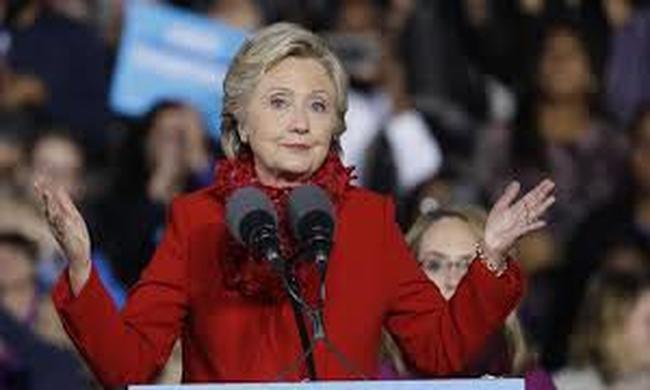In recent months, Hillary Clinton has made numerous inaccurate statements about those Americans working for what the Constitution calls a “convention for proposing amendments.” Because of Clinton’s national standing, her claims merit a response.
Under Article V of the Constitution, when two-thirds of the state legislatures (34) pass matching resolutions called “applications,” Congress must call a convention to propose, not enact, constitutional reforms. The idea is to allow Americans, working through their state legislatures, to propose amendments the Washington, DC establishment opposes.
Because of dissatisfaction with the federal government, several campaigns have sprung up favoring corrective amendments. Although they span the political spectrum, collectively they are referred to as the “Article V movement.”
This article lists some of Clinton’s statements and corrects each:
Clinton: “There’s a big move for change coming from the right that I think would be disastrous for our country.”
Correction: Only one of the major Article V campaigns is based primarily on the right. It is the “Convention of States” organization—assuming one defines reducing federal power as solely a “right wing” cause. The other campaigns promote solutions also favored by the center and left. For example, despite recent efforts by establishment politicians to marginalize the campaign for a balanced budget amendment, its cause is broadly bipartisan. Several state legislatures have signed on with unanimous or overwhelming bipartisan votes. Similarly, U.S. Term Limits enjoys broad bipartisan support.
On the left is the WolfPAC organization. It favors campaign finance reform and has the support of several liberal-leaning state legislatures.
It’s important to remember the Constitution established the amendments convention procedure for all Americans, not just for those on any particular side of the political spectrum.
Clinton: “They want radical, ‘pull ’em up by the roots’ change.”
Correction: None of the amendment campaigns—right, center, or left—favors the open-ended convention needed for radical change. All of their model legislative applications severely limit the convention’s scope.
Clinton: “They want to have a constitutional convention to rewrite our Constitution, to make it friendlier to business, to inject religious and ideological elements.”
Correction: The Constitution does not authorize a constitutional convention, and none of the amendments campaigns advocates one. They favor only a limited gathering—what the Constitution calls a “convention for proposing amendments.” This idea is not unique: American history has witnessed several conventions that suggested constitutional amendments, although none of those conventions had formal proposal power.
Moreover, a convention for proposing amendments has no power to “rewrite” the Constitution. As its name indicates, it may only propose amendments. To be effective, any amendment must be approved by three-fourths of the states (38). This formidable requirement ensures that any amendment enjoys support from the overwhelming majority of the American people’s representatives.
Clinton’s comments about business and “religious and ideological elements” are pure fantasy. None of the legislative applications being promoted by the Article V Movement contain anything specifically pertaining to business, religion, or ideology.
Clinton: “So talk about radical change! They are pursuing it, they are funding it, and they are electing people that are either true believers or are willing vehicles for it.”
Correction: Clinton has the funding situation exactly reversed. All the Article V campaigns have budgets ranging from minimal to modest. None has the financial power to elect anyone. By contrast, their leading opponents—such as the Washington, DC pressure groups Common Cause and the Center for Budget and Policy Priorities—enjoy annual budgets in the tens-of-millions.
Clinton: “The right wing, aided and funded by Mercers, Koch brothers, etc. is very serious about calling a constitutional convention.”
Correction: Again, the Article V campaigns are not seeking a “constitutional convention.” They are simply trying to exercise a constitutional right akin to the right to vote.
Furthermore, the Article V movement cuts across ideological lines. Some right-wingers favor it, as do some left-wingers. Other right-wingers oppose it, as do some left-wingers. My constitutional research helped renew the movement, and I’ve been involved with it for over eight years. I’m personally unaware of any Article V funding from either the Mercer or Koch families. Like the overwhelming majority of those involved in the cause, I do most of my work as a volunteer.
Clinton: “Part of their gerrymandering is to control state legislatures, elect Republican governors.”
Correction: All the Article V campaigns are nonpartisan. Several draw wide support from both liberals and conservatives. Incidentally, the comment about Republican governors is further evidence that Clinton’s is ignorant of the process: State governors have no role in the Article V process.
Clinton: “If you really get deep into what they’re advocating: limits on the First Amendment, no limits on the Second Amendment, limits on criminal justice.”
Correction: The only Article V campaign favoring changes in the First Amendment is WolfPAC, which is based on the left, not the right. Neither the Second Amendment nor criminal justice are the subjects of any Article V campaign.








